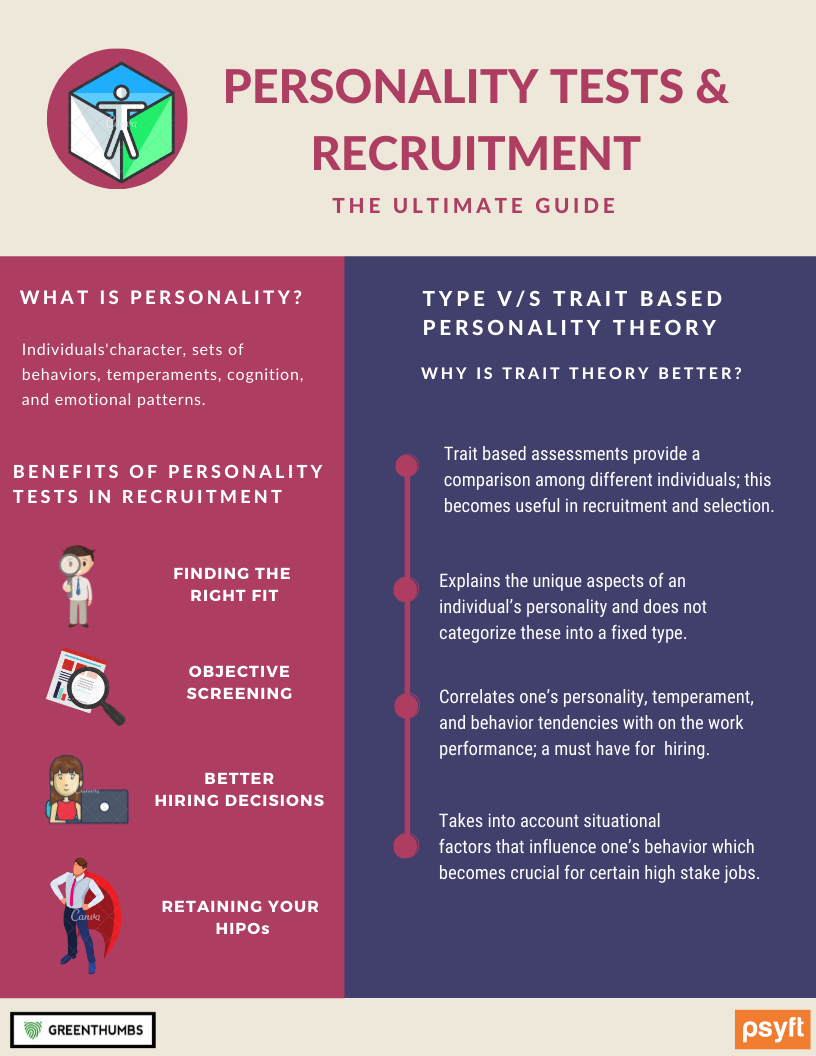Blogs
Get latest insights on what's trending in the HR world - Talent Search, Talent Assessments, Psychometrics, Employee Engagement, Appraisals & much more.

Personality Tests & Recruitment - The Ultimate Guide
1st May 2020
What is Human Personality?
Personality is defined as an individuals' character, sets of behaviors, temperaments, cognition, and emotional patterns. There is no universal definition of Human Personality. Over the years it has been described differently by different theories. It is an individual’s personality that makes him or her unique among others. In every organization personality of an individual is considered as an important aspect.
Here are some components that form a human personality:
- Actions
- Expressions
- Responses & Reactions
- Psychological
Analyzing Human Personality
World’s First personality assessment was “The 16 Personality Factor Questionnaire” developed by Raymond Cattell and his colleagues in the 1940s and 1950s to discover the basic traits of human personality using scientific methodology. The test was first published in 1949. Since then, a lot of personality assessments, personality theories and models have developed that explain and analyze human personality form different fronts.
Importance of Personality Tests in Recruitment
Personality can predict performance! Human personality is an indicator of an individual’s character, temperament and behavioral preferences and thus a predictor of his/her work performance.
A personality assessment proves to be very useful for recruiters and hiring managers when it comes to gathering objective insights about potential hires and shortlisting them.
1. Finding the Right FitHiring managers need to look at a lot more than just review a CV, they need to guarantee that any candidate they hire will be successful at the company, will be a great fit both role wise and culturally. A regular list of skills and qualifications has limited use. Personality tests help gain insight into the personality traits of potential employees and extend one’s understanding of a candidate beyond what is mentioned in the resume. Every individual is different and so is every job role. A right employee in the right role with the right personality traits can be a deciding factor in the success of any business.
2. Better Hiring DecisionsHiring decisions can’t always be based on gut instinct or first impressions -- no matter how impressive. A pre-employment test helps determine an individual candidate’s unique preferences, temperament, potential behavior patterns, etc. Thus, such assessments offer a great return on investment to an organization by helping reduce the potential hiring mistakes and having much better insights into a candidate.
3. Objective ScreeningA professionally vetted, fully scientific tool, standardized assessment, backed by statistical validation following top psychometric standards minimizes subjectivity & inadvertent personal biases in the hiring process. Additionally, with the coming in of ipsative framework, interviewers can also match their findings with the assessment results to reduce the chances of any candidate faking a particular behavior and personality.
4. Increased Employee RetentionAlong with hiring right, it’s also crucial for organizations to retain talent, reduce absenteeism and turnover. With personality assessments, hiring managers can screen candidates more efficiently for aptitude and personality, stress tolerance, work attitude, etc. and assess whether a candidate is likely to stay in the role and with the company for long.
Kinds of Personality Assessments
Broadly speaking, there are two kinds of personality assessments –
Type Based Personality AssessmentsType Based Personality Assessment assesses an individual’s personality by categorizing them in particular types. In other words, Type-based personality tests measure an individual’s personality traits and categorize them under different qualitative categories, for example - “Introverts” or “Extroverts”, “Intuition” or “Sensing”, “Thinking” or “Feeling”, “Judging” or “Perceiving”, etc.
Some of the assessment tools based on type based theory include - Myres Briggs Type Indicator (MBTI), The Winslow Personality Profile, Hexaco Personality Inventory, etc.
Trait Based Personality AssessmentsTrait Based Personality Assessment assesses various aspects of an individual’s personalities which form the basis of their behavior in particular ways at particular times. Aspects of people’s personality will tend to vary and thus come in a wide variety of personality descriptions. Such assessments tend to explain personality in various contexts of life such as work.
For Example – Optimism, Ambition, Extroversion, and Humor. A few assessments based on this model are Disc Assessment, The Birkman Method, The Enneagram, Psyft Personality Assessment, etc.
The Five-Factor Model
The five-factor model (FFM) also known as the Big Five personality traits, and the OCEAN model, is a taxonomy, or grouping, for personality traits. This theory talks of five broad dimensions to describe the human personality.
The five factors are:
- Openness to experience (inventive/curious vs. consistent/cautious)
- Conscientiousness (efficient/organized vs. easy-going/careless)
- Extroversion (outgoing/energetic vs. solitary/reserved)
- Agreeableness (friendly/compassionate vs. challenging/detached)
- Neuroticism (sensitive/nervous vs. secure/confident)
Type v/s Trait theory - Why the Trait Theory Is Better?
It is believed that the trait based personality assessments are more psychometrically sound and allow for more accurate comparisons between individuals.
- Trait based assessments can be used in combination with other exercises in activities that require a comparison between different individuals, like in case of recruitment and selection.
- Trait theory accurately explains the unique aspects of an individual’s personality and does not categorize these into a fixed type. Human personality is a complex combination of different aspects and cannot be always be confined to a type.
- The trait based personality theory correlates one’s personality, temperament and behavior tendencies with on the job behavior, work performance, a must have when it comes to hiring the right talent.
- Trait theory takes into account situational factors that influence one’s personality and behavior which becomes crucial concerning certain high stake jobs.
Popular Personality Assessments:
Myers-Briggs Type Indicator is based on the psychological types described by Carl Jung and developed by Isabel Briggs Myers and Katharine Briggs. Myers – Briggs Type Indicator is one of the most popular type based personality assessment.
The theory talks about 16 different personality types, people can identify one of 16 personality types which are made up of four different scales –
- Extraversion (E) - Introversion (I)
- Sensing (S) - Intuition (N)
- Thinking (T) - Feeling (F)
- Judging (J) - Perceiving (P)
DISC The DISC Personality theory was developed into a behavioral assessment tool by an industrial psychologist - Walter Vernon Clarke. The DISC personality profile measures behavioral styles and describes people regarding their levels of dominance, influence, steadiness, and compliance.
Psyft Personality AssessmentPsyft Personality Assessment (PPA) is a trait based personality assessment. It is an innovative and scientifically created instrument that measures relevant personality traits critical for work. It is designed to help organizations gain access to objective information about a job applicant or an employee. The PPA measures twenty personality traits that relate to job performance.
PPA has high predictive validity that can analyze how personality can affect performance and anticipate certain outcomes like, “avoiding counterproductive behavior, reducing turnover and absenteeism, exhibiting more teamwork and leadership, providing more effective customer service, etc.
Conclusion:
Human Resources continue to evolve to meet the changing demands of the fast-paced, immensely dynamic and digitally-driven environment. Personality Assessment is one such tool that offers support to the entire array of HR practices, right from hiring to training to retention. A scientifically robust and validated personality assessment shines is in its ability to identify high-potential individuals, work behavior, and much more.
Recent Articles
- When Everyone Wants WFH - Tips To Manage An Expanding Team Of Remote Employees
- 5 Proven Strategies To Retain Your Best Talent In 2022
- Why Organizations Should Take Exit Surveys Seriously
- How To Create A Culture Of Recognition In The Workplace
- Why Manager Effectiveness Survey Is Important For A Workplace
News Center
- India Today - 7 reasons companies ask for psychometric tests
- Business World - AI - The New Secret Sauce in Psychometric Assessments
- DNA - HR Trends for 2018
- The Hindu - Psychometric Assessment a "game changer" in hiring
- Entrepreneur - 9 ways to promote actionable feedback at organisations
- Human Capital - Looking Beyond Performance Appraisals


